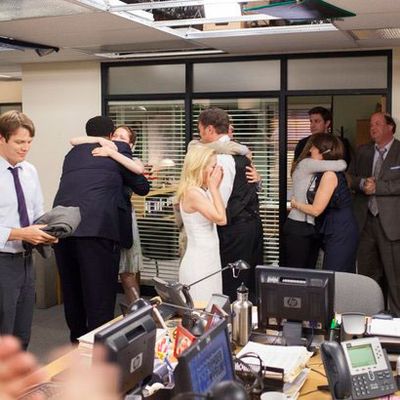
The Office’s last two episodes – last four, if you consider this week’s finale and last week’s episode to be double features – were sweet, charming, and often sneakily powerful. I’m surely not the only viewer who was a wreck throughout large sections of each: Jim’s video declaration of love for Pam, Erin finally meeting her mother and father (played by Joan Cusack and Ed Begley, Jr.), and the entirety of Dwight’s wedding to Angela (with special surprise guest appearance by Michael) scored especially high on the waterworks scale.
How much of this emotion comes from the show’s writing, direction, and acting, and how much comes from the audience’s bittersweet feelings about letting go of a fictional world they’ve lived in for years? I doubt anyone can say for sure, and maybe it doesn’t matter; but I think it’s fair to say that neither the laughter nor the tears inspired in this final run of episodes were unearned. “A.A.R.M” and “Finale” exemplified most of the best of The Office’s finer qualities and almost none of its missteps.
In fact, these two episodes were so consistently fine — goofy, clever, surprising, and unaffectedly emotional — that they reinforced the notion that the relationship between a show and a viewer really is a relationship, or at least a self-contained, virtual version of a relationship. There are great times, okay times, and bad times. Sometimes you’re more attentive or affectionate or otherwise invested than other times. Sometimes you check out emotionally, or give up, then sort of wander back into it for whatever reason and start caring again — really caring, to the point where you feel a bit guilty for not having appreciated its better qualities during the hard times. But if the relationship is fundamentally sound — if, for the most part, it’s making you happy, or at least content — then you consider it time well-spent and become increasingly sad when an irrevocable end draws near. “It’s like a long book that you never want to end, and you’re fine with that, because you just never, ever want to leave it,” Pam told the audience at the panel discussion during last night’s finale.
That’s why I’m not too interested in weighing whether The Office made the most of its intriguing, final-season decision to turn the camera crew and its laughably long-term documentary project into a part of the narrative. (I wrote about this here.) I doubt anyone really obsessed too much over whether the series had a firm grasp of the show-within-a-show, representation-versus-reality aspects, much less a plan on how to sum it up and make sense of it, so I don’t mind that it didn’t do a lot with the filmic ruptures it wove into this year’s plotlines: Pam’s emotional affair with the chivalrous cameraman, for instance, or the occasional scenes addressing the workers’ discomfort with having their lives repackaged as a nonfiction TV show.
The last four episodes dove into these deep waters again, particularly in the scenes of Andy humiliating himself during auditions for a singing show, and the sequence in the finale in which the gang fielded intrusive, often clueless questions from audience members who’d seen the documentary on PBS. (I love Pam insisting that she’d rather not reveal the contents of the Teapot Letter, and the questioner replying, “I hear ya … But what did it say?”) But the show always swam back to shore as fast as it could, perhaps realizing, wisely, that The Office was never primarily about, in Dwight’s words, “modern surveillance technology” and the “constant state of being watched.” It was always more of a sitcom about the emotional bonds that are invariably forged when people spend a long time in each other’s company, be they coworkers at a paper company or a camera crew filming its subjects or viewers tuning into the same show week after week for nine seasons.
When Jim asked the crew to help him make that love letter/apology video for Pam last week, it didn’t play like a rupture of the show’s always-porous life-art membrane, but a favor being asked for and happily granted. The crew was just doing what we would have done for Jim and Pam if we’d been there. And we kind of were there: That’s the understatedly beautiful thing about this moment and so many others. What looks like Stockholm Syndrome from one angle looks like a beautiful friendship, or a beautiful romance, from another; tomato, tomahto. The Office gets this, too. The show’s decision not to underline, highlight, and dissect every aspect ultimately speaks well of all involved. To go too much further would have shattered the gentle spell cast by the The Office when it was at its best, as it was these last couple of weeks. “Is it me? Is it Nellie?” Pam asked a sobbing Toby, slow-dancing at the reception. “It’s everything,” he replied.


